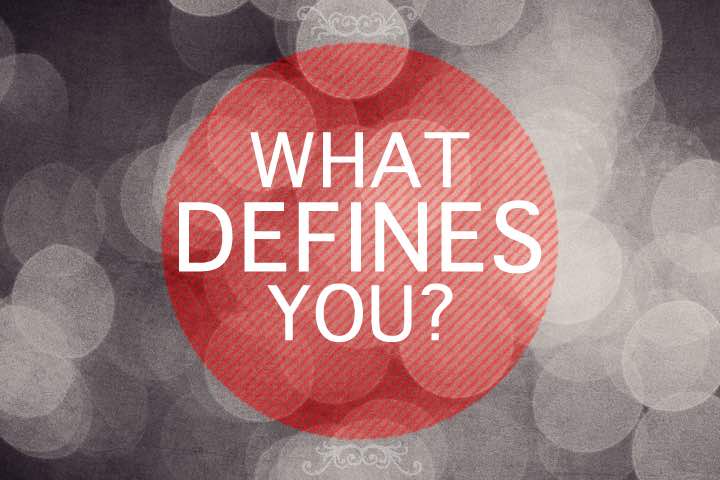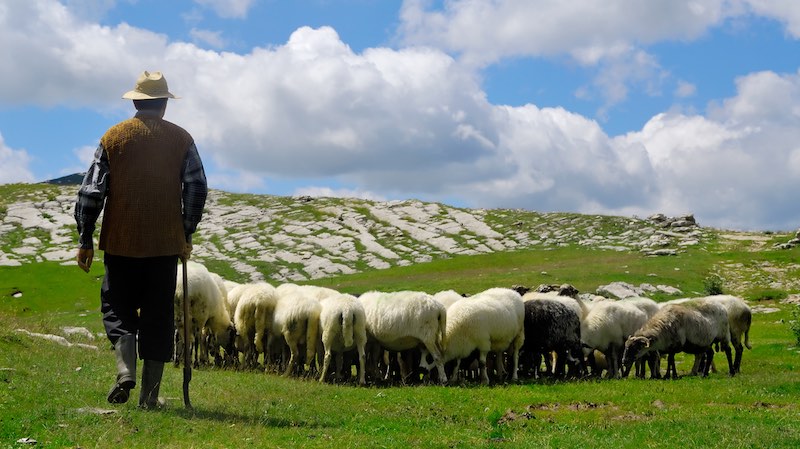Who are you? How do your daily actions and choices define who you are? A person is often characterized by his or her actions and by the way that one chooses to use his or her time each and every day.
I was recently talking with a friend and explaining to her how the year of the Corona pandemic has altered my life and my occupation. Anyone who knows me is familiar with the fact that for nearly a decade now I have been hosting groups week to week for the Sabbath Experience, Tabernacle Feasts, Passover Seders, as well as other biblical holidays, however, this all ended in March of 2020. This was my main source of income but now I need to transition to a new platform as I plan for the future.
I explained to my friend how I plan to shift the focus of my time and energy from hosting groups for the Sabbath to teaching the Bible from the Jewish and Hebraic perspective. This friend responded to me by saying, “So you will be a Bible teacher now. Well, to me you will always be the Sabbath guy.” How we choose to invest our time is often used to identify who we are.
Practicing The Sabbath
Celebrating the weekly Sabbath and leading others in this joyous event has been a priority and focus for me ever since immigrating to Israel over a decade ago. As many of you know, I have even written a book on this subject of practicing the Sabbath. These many years of hosting, teaching, and leading thousands of others in the Sabbath celebration has helped to define who I am. To many in this world I am known as the Sabbath guy! Hopefully, after a few years of Bible teaching I will gain the right to be called the Jewish Bible teacher!
We are known by our actions and how we spend our time and energy. How do you spend your time and energy? How are you known in your community? What defines who you are?

Twins: Different From Conception
In this week’s Torah Portion we read about the birth of Jacob and Esau. Although these brothers were twins, they could not have been any more different. The differences between Jacob and Esau started in the womb as they wrestled with one another in their mother’s belly (Gen. 25:22). This then continued during birth as Esau came out first but at the same time Jacob was grasping Esau’s heal as they were exiting the birth canal (Gen. 25:24-26). And finally, their differences were evident the rest of their days on earth regarding their respective professions:
When the boys grew up, Esau became a skillful hunter, a man of the field; but Jacob was a civilized man, living in tents. – Gen. 25:27
Esau was a hunter but Jacob’s occupation seems to be a bit more obscure. At first glance, Jacob is pictured as a lazy man who just stayed in the tent all day or went from tent to tent. What did Jacob actually do? What was Jacob’s occupation?
Jacob’s Occupation
Both Jacob and Esau became known for how they spent their respective time and energy. As Jacob and Esau grew up, Esau is described as a hunter, a man of the field, but in order to understand Jacob’s profession we need to look more closely at the Hebrew text.
In Genesis 25:27 we read the following in Hebrew about Jacob: ויעקוב איש תם יושב אוהלים – VeYaakov Ish Tam Yoshev Ohalim which is literally translated, “…and Jacob was a blameless man, a tent dweller…” The Hebrew word תם – Tam, translated here as “blameless” is a challenging word to translate but has the meaning of being perfect, complete, or blameless. We will study this word further towards the end of this article. The second part of this description speaks of Jacob as one who dwelt in tents. This does not signify laziness but more than likely speaks of his occupation as a shepherd: someone who stays with the flock while dwelling in tents. We know that Jacob knew shepherding well (Gen. 29:7) and worked as a shepherd for his uncle Laban for twenty years (Gen. 29). Jacob was a shepherd.
More Than An Occupation
The brief description that is given to us regarding the occupations of both Jacob and Esau in Genesis 25:27 reveals more to us about the character and spiritual walk of these two brothers than simply explaining their day jobs. In a very subtle manner, we are given a glimpse into the souls of Jacob and Esau as we consider the daily choices these men made and the spiritual fruit that eventually came from their lives.
Esau The Hunter
As a hunter, Esau spent his time tracking animals in the wild, using his bow to kill them, and then bringing his fresh kill home to the family for a meal. Hunting is a part of life and there is nothing wrong with being a hunter, however, Esau’s whole identity was wrapped up in what he did.
The very name Esau in Hebrew is עשו – Esav and is the same root of the word עשה – Asah meaning to do, to act, to make, or to work. Esau was a man of action and he was very hasty in everything he did, generally lacking forethought.
When Esau learned that his parents were not pleased with his first two wives because they were Canaanites, he went out and took another wife from the daughters of Ishmael (Gen. 28:8-9), Abraham’s son by Hagar. Esau is also famous for selling his birthright to Jacob for a bowl of lentils and some bread because he was exhausted when he came home from the field (Gen. 25:29-34). Esau was quick to act but he was slow to consider the future.
The Actions of Esau
Esau was a man ruled by his appetite and he is remembered for a series of hasty decisions in life which left him far from the blessing of his father (Gen. 27) as well as far from the blessing of God. We are reminded of the spiritual deficiency of Esau’s life by this warning in the New Testament:
See to it that no one comes short of the grace of God; that no root of bitterness springing up causes trouble, and by it many become defiled; that there be no sexually immoral or godless person like Esau, who sold his own birthright for a single meal. For you know that even afterward, when he wanted to inherit the blessing, he was rejected, for he found no place for repentance, though he sought for it with tears. – Hebrews 12:15-17
Our day to day actions reveal who we are and will bear fruit one way or another. Esau’s life and actions remind us of how not to live our lives.

Jacob The Shepherd
We know from the Scriptures that Jacob was a shepherd. There are many famous shepherds that are recorded for us in the Bible: Abel, Moses, Rachel (a shepherdess), David, and even Yeshua is called the Good Shepherd (John 10:11). More important than working as a shepherd for most of his life, Jacob was characterized by how he lived his life as an איש תם – Ish Tam – a blameless, complete, or perfect man. Being characterized as “blameless” does not mean that Jacob was without sin but rather that he sought to live a righteous life before God.
Ish Tam – A Blameless Man
In order to understand the identity of Jacob as a blameless man it is necessary to see how this characterization is used of other godly people in the Scriptures. The following is said of Noah:
These are the records of the generations of Noah. Noah was a righteous man, blameless in his generation. Noah walked with God. – Gen. 6:9
The word “blameless” used in the above verse is the Hebrew word תמים – Tamim which is the plural form of the word תם – Tam. In the context of describing Noah as a righteous man and as one who walked with God, we can better understand that this word תם – Tam clearly reveals the spiritual condition of one who is seeking to walk in the ways of God.
In a similar manner we read about Job in the book that bears his name:
There was a man in the land of Uz whose name was Job; and that man was blameless, upright, fearing God and turning away from evil. – Job 1:1
Here the word “blameless” is the same word תם – Tam and is also used in the context of one walks in the fear of God and turns away from evil.
The blameless, complete, or perfect person characterizes someone who seeks the LORD, seeks after righteousness, and continually walks with God. Jacob lived his life in such a way that he was marked as one who continually walked with God.

The Hunter Versus The Shepherd
The contrast of spiritual destinies between Jacob and Esau is evidenced throughout their lives. Esau always acted according to impulse and made rash, unwise choices. Jacob always acted with much forethought and made wise decisions. Esau chased after food in order to satisfy his appetite. Jacob chased after the blessing of God and sought to establish a godly heritage. Esau gave up the eternal for the sake of the temporary. Jacob gave up the temporary comforts of home and stepped out in faith for the sake of gaining the blessing of God.
Being Counted Among The Blameless
Esau worked hard in his own strength but never found peace or the blessing of God in his life. Jacob sought the LORD and gained a seat among the great men of faith. Just like Jacob and Esau, each one of us makes choices everyday in the manner that we relate to others and how we walk with God. Far beyond any occupation that we work at during the majority of our years is the character and spiritual life that we are building day by day through our relationship with God.
One final example of a blameless person (איש תם – Ish Tam) that we read about in the Bible is in the book of Psalms:
Observe the blameless person, and look at the upright; For the person of peace will have a future. – Ps. 37:37
Those who seek fame and fortune by their mighty acts on this earth will end their life in despair. Those who seek to live a blameless life and walk with God will have peace and a future! Who are you? How do your daily actions and choices define who you are?
Shabbat Shalom!
If you enjoyed reading this article, share it today with friends! We also invite you to sign up for our weekly Torah Portion commentary on the sidebar to the right.
Help keep our weekly commentaries free and available to all. Click here to donate today:
*All Scripture take from NASB Copyright © 1960, 1962, 1963, 1968, 1971, 1972, 1973, 1975, 1977, 1995 by The Lockman Foundation
**The Hebrew name “Yeshua” is used in the biblical quotations in place of the English name “Jesus” to give emphasis to the meaning of this name, salvation. The word “Messiah” is also used in place of the word “Christ” to bring clarity to the office of Yeshua.



Thank you Daniel for this week’s “drash” on the Torah Portion. In gentile churches Jacob is usually criticised for what he did. I fully agree in what you have said. Esau being the eldest, should have been helping his father in the looking after the family. But instead Jacob was in a way doing it. What you said was insightful so thank you once again…
In other news, I’m hoping to get a unit next week. Also after I get settled, I hope to be able to finish the drawing that I started of your hands with the Kiddush cup. Be blessed this day in Yeshua. Trish from Bundaberg